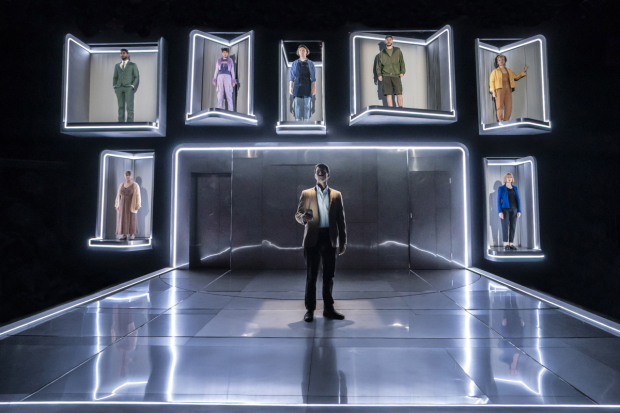”The Narcissist” at Minerva Theatre, Chichester – review

© Johan Persson
As we await the results of the (seemingly never ending) Conservative party leadership election to see which politician will helm our country – and as the world begins to collectively hold its breath and coil into a protective foetal position at the prospect of the resurrection of Donald Trump and his possible return to the White House – it is timely indeed to be exploring the narcissism of those in political power. There’s never been a better moment to shine a light on the media driven world in which we inhabit with our faces permanently up-lit by the incandescent glow of a mobile phone.
Christopher Shinn’s world premiere was due to be staged before the pandemic took hold – he took the opportunity of the two year hiatus to rewrite and rework the piece whilst seismic political activity created the kind of drama that fiction could only dream of. Why then, with such rich pickings on which to draw from is this monstrously cynical play so devoid of drama and so in need of a direction.
Jim is a weary political advisor and commentator – he predicted the horrors of the 2016 Trump win along with some of the subsequent furore. A spiral of depression and a marriage break up to boot has pushed him into a giving up politics and co-writing a book with his friend and former lover. The approach of a prospective Presidential candidate is too much to resist though and he’s soon back in the game.
The three-ring circus of politics – especially American politics – is won or lost through voter perception and is played out over social media. Living a life through the lens of the mobile phone and moving amidst a mass virtual connection leaves us profoundly disconnected. The freshly single Jim dismisses his co-writer as quickly as he abandons his tortured brother and his grieving mother – even his casual encounter with a young gay lover ends in disappointment.
The problem is that Shinn only ever skims the surface of all this dramatic potential. Meaty topics are mentioned but are quickly cast aside – drug addiction, sexuality, suicide, politics, social media – all snatched away in the blink of a text notification. The multiple plot strands and the liberal sprinkling of thinly drawn characters make this is frustratingly difficult piece to connect with.
Josh Seymour’s direction attempts to illustrate the barriers to communication by constant text message interruptions and multi-level dialogue that comes from floating chrome booths circling Jasmine Swan’s metallic set. It quickly becomes tiresome without ever fully serving its purpose.
It is difficult to get a handle on Harry Lloyd’s Jim. Lloyd gives him plenty of gusto and he often talks much sense – but his insistence that the way to win an election is through partaking in the pessimism and cynicism of the electorate is hard to fathom – “optimism in politicians is delusional” he says to Claire Skinner’s unconvincing Senator – it’s a bleak take on the world for sure, although possibly not incorrect. Jim pleads that all voters really want is “a reasonable leader with the common sense to manage the country well – someone sharp and reasonably entertaining” – Liz and Rishi should take note of that one.
Shinn tells us that individualism is “killing America and the planet”. It’s a pertinent point and a strong message – but it is sadly lost amongst the blur of a play that appears to have no real sense of what it’s trying to say.












